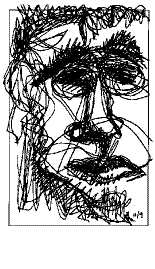FORBIDDEN LOVE is the best kind of love. The bigger the barrier, the higher the flame, and all that. And when you get past the two households of Romeo and Juliet, modern literature easily discards the old conventions. Bored housewife on disastrous adulterous bender? Madame Bovary. Middle-aged Eastern European academic besotted with pubescent American girl? Lolita. Word processor enamored of fruit? Lemon.
LEMON
by Lawrence Krauser (McSweeney’s Books, $16.50)
Thus, musician-turned-playwright-turned-novelist Lawrence Krauser’s first book stands self-aware in the modernist canon of transgressive love. His NYC protagonist, Wendell, gets dumped after writing an ill-advised memo to his girlfriend (“It’s true we were semiotically incompatible”). A pinched nerve leaves poor Wendell’s face half-paralyzed, requiring a humiliating pirate-like eye patch. The guy’s too smart for his dead-end gig as a “Memo King,” too unkempt and quirky to rebound with a fellow Homo sapiens. What does he fall for instead?
“My big yellow marble. My scrofula, my nebula, my nebulous chum”—those are just some of the pet names for Wendell’s new beloved, which replaces his old girlfriend as a kind of amulet, talisman, or fetish object. His parents, coworkers, and friends disapprove, of course, resulting in the predictable downward trajectory of the post-relationship, on-the-skids novel. Here, Krauser’s depiction of inane workplace minutiae owes something to Nicholson Baker (The Mezzanine), while his hero’s willful self-destructiveness also brings to mind David Gates’ Jernigan (crows Wendell, “Viva adver-sity!”).
Throughout, Krauser shows smart self-awareness of literary and love story convention, treating both with practiced irony; we are and we aren’t meant to treat his obsessive hero’s ardor seriously. By displacing the usual Next Woman with an inanimate object, the author collapses the form of the romance novel upon itself. She is an it. Accordingly, Lemon is a kind of Harlequin parody, but filtered through the imagination of the smart-alecky, know-it-all brainiac at the back of the classroom. Digressions, asides, and interruptions abound, with disquisitions on Handel’s Messiah, Cameron’s Titanic, and the lemon’s history in still life painting. Each riff lends to an absurdist tenor that, while more whimsical than pretentious, makes Lemon a literary exercise instead of a fully integrated or successful narrative.
THAT’S APPROPRIATE, if unsurprising, given that the book is the second effort from the publishing arm of McSweeney’s magazine (founded by Dave Eggers of A Heartbreaking Work of Staggering Genius fame). In this regard, Lemon bears the hipness of the imprint without living up to Eggers’ reputation. Lemon does share with Genius a sense of nursing—then recuperating from—loss but never achieves the latter book’s emotional connection with the reader.
Krauser’s wordplay provides plenty of entertainment, however, and the author’s sensibility seems directly inscribed upon the page. A professional copy editor, Krauser is fastidious with punctuation and style, using dashes instead of quotation marks to indicate dialogue, changing fonts for e-mail passages, even rendering one chapter in verse, e.g.:
When Romans blew through
neighborhoods that knew you
they took you for the signature of the sun,
which you were;
the brightest thing they’d seen
since they crossed the Mediterranean.
Although Krauser stops short of any Donne-like sonnets, Lemon is thick with limericks and similes. The fruit gets compared to the dimpled moon, a prison (with architecture resembling its internal structure), a submarine, a geodesic dome, a clitoris, a Faberg頥gg, and various planets. With each flight of Wendell’s fancy, there’s a sense that his romantic imagination is being enlarged, that in learning to love the lemon, he’s transcending his quotidian office routine and bickering family. He finds himself anew, even as the reader chuckles at his growing obsession. Is it, ahem, sexual? How far does it go? Far enough, then farther still.
Putting his characters in extremis seems to be a stage-honed technique for Krauser, who has authored three plays produced here in Seattle (Horrible Child in ’98 and Wall Street Made Simple and A Virtual Deal in 2000). Certainly his rhetorical flourishes are suited to spotlight and soliloquy, as when Wendell amusingly recites the games he plays with his newfound life partner: “Rock the Baby, Walk the Dog, Golden Goose, Atlas, Human Asymptote, Freezing Eskimo versus the Sealed Igloo, Foucault’s Pendulum, Rock Star Groin, Particle Accelerator, Benign Tumor, Zeno Crosses the Room, Name the Sex. . . .” The list goes on and on.
In the end, even if the smart, funny, and oddly affecting Lemon comes up short as a first novel, it still somehow makes a romantic triumph out of a man’s not moving on with his life.








